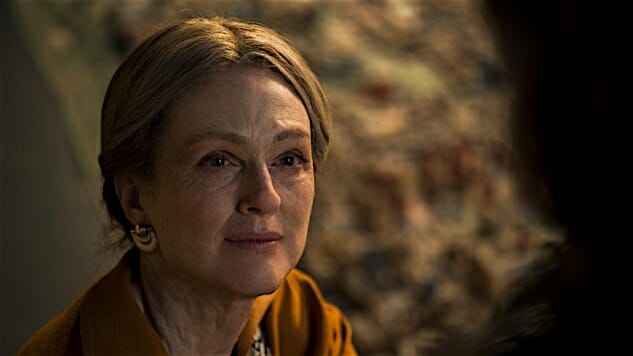
Todd Haynes has often tinkered with genres and cinematic styles, turning the Douglas Sirk film inside out for Far From Heaven or rethinking the biopic with his adventurous Bob Dylan drama I’m Not There. With Wonderstruck, the director turns his attention to the family film, using as inspiration the same author whose source material was the fuel for Martin Scorsese’s Hugo. There’s a fascinating tension between Haynes’ clinical, meticulous approach and the conventions (and limitations) of the story he’s telling. But in the process, Wonderstruck emerges as an exceedingly intelligent children’s film that values the brains of its young characters—as well as the kids’ who might see it. This may not be Haynes’ best work, but it’s the one most likely to make you cry.
Working from a screenplay by Brian Selznick (who also wrote and illustrated the 2011 novel), Haynes splits his narrative into two interweaving pieces. The first takes place in 1977: A 12-year-old named Ben (Oakes Fegley) is mourning the recent death of his saintly mother (Michelle Williams), while pondering the whereabouts of his father, a man he never met. The second thread occurs in 1927: A young deaf girl named Rose (Millicent Simmonds) is drawn to a silent-screen star (Julianne Moore), venturing from New Jersey to New York to meet her.
Both storylines involve the characters taking trips to the Big Apple in the hopes of finding something or someone that brings meaning to their life, and Haynes (working with editor Affonso Gonçalves) often deftly moves between the two, finding intersecting emotional through-lines. Those connections help since Haynes has filmed the segments in strikingly different ways. 1927 is in dreamy, purposely stylized black and white, as if Rose lives in a silent movie—albeit without title cards to guide the viewer. 1977 has the feel of faded color snapshots, and when the action moves to New York, the city hums with humid, gritty energy. Ed Lachman, who has received Oscar nominations for Carol and Far From Heaven, provides his usual evocative tinge to the photography, creating hyper-real environments for our young protagonists.
There’s an inherent downside to Wonderstruck’s back-and-forth structure. Constantly jerking the audience between time frames can start to feel repetitive as the novelty of the approach slowly fades. In addition, once it becomes established that Haynes is underlining the narratives’ thematic similarities, it’s inevitable that viewers will try to jump ahead and guess precisely how these two threads will eventually connect.
Still, Haynes mostly sidesteps these issues by letting the two halves work together to tell a whole story. In this regard, Carter Burwell’s score is crucial: The acclaimed composer has crafted minimalist instrumental music that suggests both wonder and fragility. With much of Wonderstruck avoiding conventional dialogue—Rose is deaf and Ben, thanks to a weird fluke, will lose his hearing during the film—Burwell’s arrangements need to do a certain amount of the emotional heavy lifting. His score is exquisite, capturing the terror and the wide-eyed excitement felt by two kids venturing into the big city.
Wonderstruck also benefits from the director’s trademark reserve. Though not nearly as chilly as most of his works, Wonderstruck nonetheless resists catering to the mawkishness of the source material. Instead, Haynes emphasizes the universal need for community that both kids face. It’s remarkable how much he respects Rose and Ben, treating them like adults and not dumbing-down their responses to what befalls them. (Similarly, the film’s depiction of deafness is uncommonly respectful and mature, never using it as a plot gimmick or a cheap disease-of-the-week sympathy ploy.) In Wonderstruck, Rose will meet the actress, and Ben will find answers to why his mother had a bookmark from a New York secondhand store. But those journeys are rendered with a scarcity of cutesiness.
Not surprisingly, Haynes encourages his adolescent actors to give unfussy performances. Recently seen in Pete’s Dragon, Fegley has all the complicated, bratty angst of a typical preteen, while deaf actress Simmonds makes for a luminous Rose. As Wonderstruck progresses, his story becomes more important than hers, leaving the film feeling slightly unbalanced, but the sweetness the young actress brings to the character compensates.
Sure enough, Rose and Ben do share a destiny, the reveal of which will lead to the sort of dipped-in-starlight enchantment that’s de rigueur for children’s literature. Wonderstruck doesn’t entirely avoid getting a bit gooey as it moves toward its finale, but Haynes delivers an ending that’s legitimately magical and moving. In his films, he has conjured up plenty of sensations—from the creeping horror of Safe to the elegant melancholy of Carol. But he’s never been as unabashedly emotional as he is at Wonderstruck’s conclusion. He’s not really reinventing or subverting a genre. Rather, Haynes is applying the same smarts and curiosity he always does, openly questioning why a kids’ film can’t be as absorbing and thoughtful as any other kind. For all of its risk-taking and immaculate technical rigor, Wonderstruck is as close as he’s ever come to making a mainstream entertainment. It makes you wonder what challenge he’ll give himself next.
Director: Todd Haynes
Writer: Brian Selznick (screenplay and novel)
Starring: Oakes Fegley, Julianne Moore, Millicent Simmonds, Jaden Michael, Cory Michael Smith, Tom Noonan, Michelle Williams
Release Date: Screening in competition at the 2017 Cannes Film Festival
Tim Grierson is chief film critic for Paste and the vice president of the Los Angeles Film Critics Association. You can follow him on Twitter.